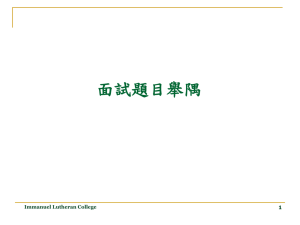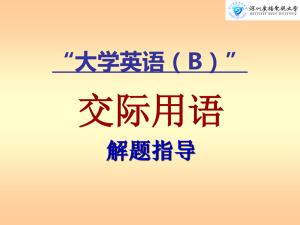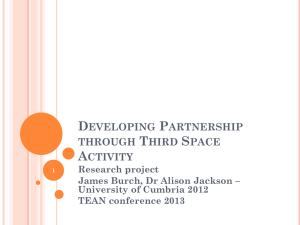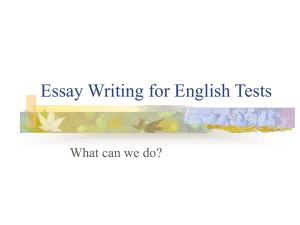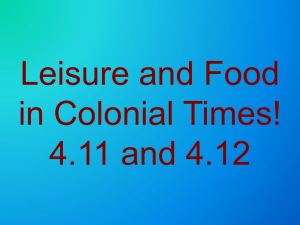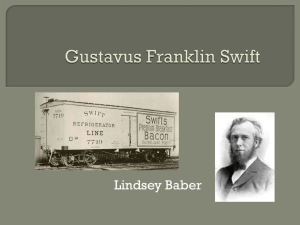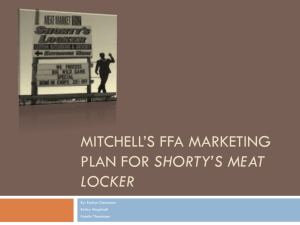第三章词义的选择与转换
advertisement
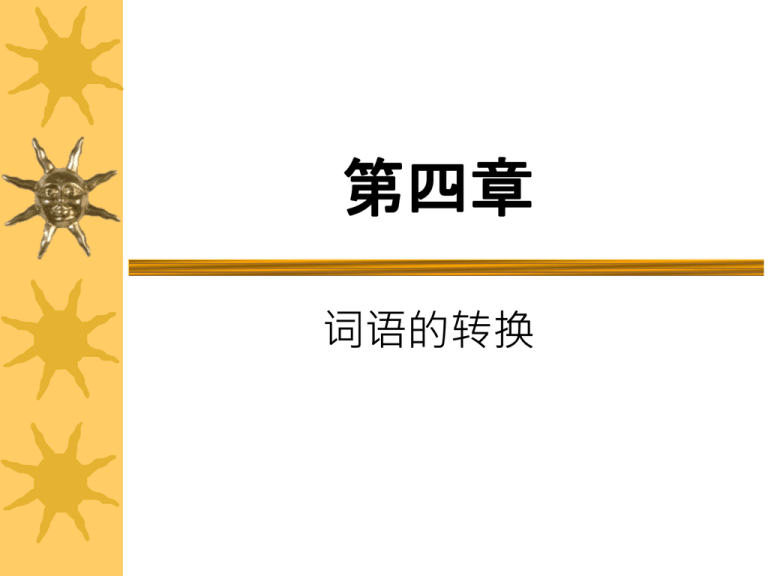
第四章 词语的转换 词语的转换 词的选择与词义的转换 词类的转换 句子成分的转换 词语的转换 增 减 换 改 “增”就是在译文中增 “减”就是在译文中 添或重复某些词语(即 词语的增补与重复) 省去某些词语(即词 语的省略) “换”就是根据特定的 “改”就是把原文中 上下文和逻辑关系把原 来的词语换成更符合原 文确切含义的或更符合 译文行文习惯和语法规 律的词语(即词语的转 换) 词语的顺序或语句的 结构重新加以组织安 排(即词语的调整与 改装)。 第一节 词的选择与词义的转换 一、词义的对应关系 二、词的选译与词义的转换 在英汉互译中,准确地分辨原文中词 汇的词义,并正确地选择译文中的对应词, 就成为一个十分关键的问题。 英汉词义的对应程度 : 英汉词义范围完全对应 英汉词义范围完全互不对应 英汉词义范围只有部分对应 英汉词义范围完全对应 Shakespeare莎士比亚 Dickens狄更斯 New Zealand新西兰 The Himalayas喜马拉雅山 computer计算机 terramycin土霉素 pneumonia 肺炎 英汉词义范围完全互不对应 teenager(十三至十九岁的青少年) red meat(颜色较深的肉,如牛羊肉) white meat(颜色较浅的肉,如猪肉、 鸡鸭肉等) libber(妇女解放运动积极参加者) bottom-liner(关心最后经济效果的企业 管理人员) 阴阳(yin and yang, the two opposing principles in the nature, the former feminine and negative, the latter masculine and positive) 火锅(chafing dish) 饺子 (dumpling or jiao zi ) 英汉词义范围只有部分对应 (A)部分词义重叠的对应关系 (B)整个与部分的包容关系 (A)部分词义重叠的对应关系 汉语: 看电影 看戏 看(望)朋友) 看病 看破 英语: see a film see a play or an opera see a friend see a doctor or see a patient see through 看书 read a book 看报 read a newspaper 看电视 watch TV 看球赛 watch a ball game 看不起 look down upon 看得起 think highly of see I see what you mean. see=明白,懂得 I’ll see you home. see=陪送 dispatch 派军队dispatch troops \ / 派 / \ send 派代表团send a delegation 送信儿send a word \ / 送 / \ 送货deliver goods deliver 发言(发表演说)deliver a speech \ / 发 / \ 发信post a letter post \寄—寄包裹post a parcel (B)整个与部分的包容关系 由于英汉对应词词 义范围的广、狭不同而造成 的一种部分对应关系。 学习 Learn, study 逃跑 run away, escape,flee run away强调“逃跑”这一 动作,并表示通过“跑”而 “逃脱”; escape强调“逃跑”的结果, 表示已经逃脱了危险或困难 处境,而获得了自由; flee则强调“逃跑”时“慌乱 而紧急”的状态。 take “带”、“夺”、“捕”、“吃”、 “掏”等 香(味) fragrant,scented,sweet-smelling, delicious 二、词的选译与词义的转换 选词,就是在翻译过程中,有些词不 能按原文字面的含义来译,而需要适 当改变、扩充或缩小词义,以便更好 地表达原文的思想内容。 二、词的选译与词义的转换 改变、扩充或缩小词义的翻 译方法,就叫做词义的转换。 (-)必须根据上下文以及词的搭配 关系来吃透原文的确切含义 现代英国语言学派创始人Firth曾 说过,“每个词在不同的上下文中, 会成为含义不同的另一个新词 (Each word when used in a new context is a new word.)。” (-)必须根据上下文以及词的搭配 关系来吃透原文的确切含义 英国哲学家Wittgenstein也曾 说过,“一个词的含义只能 从该词在语言的应用中去获 得(The meaning of a word is its use in the language.) (1)今天天气很好。 It's fine today. (2)我的病好了。 I’m well/all right. (3)你们对我真好。 You are really kind to me. (4)这事好办。 This is easy to handle. . (5)好景不长。 Good times don’t last long. (6)形势有好转。 The situation took a favorable turn. (7)我已经好久没有看见 他了。 I haven't seen him for a long time. (8) 我 好 几 个 星 期 都 不 在家。 I stayed away for several weeks. (1)心脏 (2)心情/情绪 (3)心血 (4)心意 (5)心愿 (6)心思 the heart state of mind/mood painstaking care regard/kind feelings wish/dream/ cherished desire thought/ idea ( 7) 心理 ( 8) 心坎 ( 9) 心肝 (10) 心腹 mentality/ psychology the bottom of one's heart Darling trusted subordinate (11) 心胸 breadth of mind (12)心病/事 worry/anxiety/ something weighing on one's mind and (1)表示原因: He was sick and took some medicine . 他(因为)病了,所以吃药。 He took some medicine and was sick. 他(因)吃了药,(而)感到不舒适。 (2)表示结果 He told her the bad news and she wept. 他把这坏消息告诉了她,(结果)她 哭了。 Water the seeds and they will grow. 种子一经浇水,就会生长。 (3)表示条件: Be bold but cautious in whatever you do, and you will attain your goal for sure. 胆大心细,事事如意。(如果能做到胆 大心细,就会事事如意。) One more such loss, and they are ruined. 倘若再受一次这样的损失,他们就要破 产了。 (4)表示目的 : Be sure to come and see me. 一定要来看我。 Go and turn on the radio. 去把收音机打开。 (5)表示转折 : Eat to live and not live to eat. 吃饭是为了活着,但活着不是为了吃 饭。 He promised to give me a quick answer and he didn’t. 他答应从速回答,但没有办到。 (6)表示选择 : All his property will be bequeathed (=left by will)to a person and his bodily issue. 他的全部财产将遗赠给一个人或他的 子女。 This will include property taxable for state and county purposes. 这将包括供州或县支配而可课税之财 产。 (7)表示对比: Always be true in word and resolute in deed. 言必信,行必果。 Cherish lofty aspirations, and study perseveringly. 人贵有志,学贵有恒。 (8)表示同时发生的动作: He sat and watched television. 他坐着看电视。 They walked and talked. 他们边走边谈。 (9)表示先后相继发生的动作: I woke up and got out of bed. 我睡醒之后就起床。 He took his breakfast at seven and went to work at eight. 他七点钟吃早点,八点钟上班。 (10)表示继续重复发生的动作: She knocked and knocked. 她连续不断地敲门。 It rained and rained. 雨一直下个不停。 (11)表示强调: The people and the people alone, are the motive force in the making of history. 人民,只有人民,才是创造世界历史 的真正动力。 He has only one dictionary and that dictionary is an old one. 他只有一本词典,而且这本词典还是 旧的。 (12)表示各种各样: There are friend and friends. 有各种各样的朋友(有损友,也有益 友)。 (13)and前面与good或nice连用,表 示“很”“非常”的意思,相当于 very: It was good and cold yesterday. 昨天天气非常冷。 This room is nice and warm. 这房间很暖和。 (14) and用于连接两个数字时,表 示“加”的意思,相当于plus: Three and three makes six. 三加三等于六。 (l5)and用于连接两种职称时,表示 “兼职”的意思,相当于in addition to being: Comrade Li is Chairman and Party secretary. 李同志是主任兼党支部书记。 (16) and用于连接两种食品时,常表示二者 合成的一种(而非两种)食品,相当于served with或covered with: bread and butter 涂黄油的面包 ham and eggs 火腿蛋 meat and potatoes 土豆烧牛肉 get (1) Go and get your supper. 去吃晚饭吧。 (2) Get me the book. 把书给我拿来。 (3) Have you got a typewriter? 你有打字机吗? (4) I have got a cold. 我患了感冒。 (5) Get him to see the doctor. 劝他去看病。 (6) How does he get his living? 他是怎样谋生的? (7) We've got to the station at six. 我们六点钟到达火车站。 (8) We've got to make the most of every minute. 我们必须充分利用每一分钟。 (9) Please get me to Shangshai. 请给我接(电话)上海。 (10)It's getting warm. 天气日渐变暖。 (11) She got red. 她脸(变)红了。 (12) He get beaten. 他遭到了痛打。 (二)必须根据词义对应范围 的广狭、词义分量的轻重、词 的褒义或贬义的情感色彩等, 作出恰当的处理。 “to wash one's hands of” “洗手不干” “断绝关系,不再来往” “不再承担责任” “I’ll wash my hands of the matter.” 这件事,我洗手不干(不再参与)了”。 He washed his hands of his wife. 他和妻子脱离了关系。 I don’t know why my son turned to be a good-for-nothing,I’ll wash my hands of him. 我没有想到我儿子竟是个窝囊废,我再 也不管他了。 惊异 surprise, astonish amaze surprise最轻,表示“出乎意料的惊讶或 惊喜”; 她接到多年不通音信的哥哥的来信,感 到很惊异(出乎意料)。 She was surprised to receive a letter from her brother she had not heard from in years. astonish较重,表示“令人惊异到无法 相信的程度”指无法解释的事情,而 且往往是对感情而言的; 她听说自己最知心的朋友老张竟会说 她的坏话,深感惊异,(简直无法相 信)。 She was astonished to learn that her bosom friend Lao Zhang had been speaking ill of her. amaze最重,表示“惊讶到使人困惑 不解的程度”,指在理智上惶惑不解。 许多外国人对中国人民1976年以来所 取得的成就十分惊异(简直惶惑不 解)。 Many foreigners are amazed at what the Chinese people have achieved since 1976. great 伟大 非常 了不起 好极了 That’s great! 好极了。 They are great friends. 他们是真正的朋友。 What a great big potato! 好大的一个土豆! 我觉得你过于自信了 (译文1) I think you are too sure of yourself. (译文2) I’m afraid you are too sure of yourself. (C)英汉两种语言的褒义词(commendatory terms)和贬义词(derogatory terms)翻译。 Ambitious 有抱负(褒义) 野心勃勃(贬义) This student is bright and ambitious. 这学生很聪明,而且有抱负。 “The gang of four” was an ambitious political Clique. “四人帮”是个野心勃勃的政治小集团。 hand in glove ①Those two comrades are hand in glove with each other. 那两位同志亲如手足。 The reactionaries work hand-in-glove with the imperialists. 反动派和帝国主义互相勾结。 invade In 1931 the Japanese troops invaded the Northeast of China. 1931年日军侵占了中国的东北。 We had been conferring with our allies on the question of whether and when the island should be invaded. 我们已经同我们的盟国商谈了是否进攻 该岛及何时进攻的问题。 success I am rejoiced at your success. 我为你的成功而感到高兴。 Notice how the cold,colourless men, without ideas and with no other passion but a craving for success get on in this society. 请看那些冷漠无情、庸俗平凡、头脑空 虚、只知追逐功名利禄、对别的毫不关 心的人们是怎样在社会上鬼混的。 experience the ten years’ experience of the Cultural Revolution? 你难道忘记了十年文化大革命的教训 吗? Have you forgotten fairly,rather fairly rather 相当地、颇有几分。 相当地、颇有几分。 但 是 fairly 往 往 用 来 但是rather往往用来 修饰含有“好的”、 修饰含有“不好的”、 “合意的”褒义词。 “不合意的”贬义词。 “rather bad” “fairly well” “fairly diligent” “rather lazy” 如果fairly或rather用来修饰一个中性词, 含义也有差别。 ①This book is fairly easy. 这本书相当容易。(含有“容易得很适 当,读起来很方便”的意思。) ②This book is rather easy. 这本书有点太容易了。(含有“过于容 易而不适当”的意思。) (三)必须防止望文生义,注意词的 内含意义和联想意义,并要学会运用 必要的引申手段。 (A)翻译时即使是最常用的词或 词组,只要有一点疑难,都要认 真查查词典。 (1) He is a bad drunk. 他是个很坏的酒鬼。 他是个不善于饮酒的人。 说明:此处bad=poor, drunk=drunkard (2)I felt myself at home. 我感到自己在家。 我觉得舒服。 说明:feel at home=feel at one's ease or not feel worried;feel as if in one’s own house (3) Suddenly he felt a call of nature. 他突然感到造化的一声召唤。 他突然想上厕所(解手)。 说明:a call of nature是一个固定词组,意思是 “要大便或小便的感觉” (=a need to pass water or waste matter from the body) (4) I know he meant business. 我知道他的用意在做生意。 我知道他不是开玩笑的。 说明:mean business= be serious(当真的) (6)The lecture carried his audience with him. 讲演者把他的听众带走了。 讲演者博得全场的喝采。 说明:carry=with the support, sympathy and agreement of(获得……的赞同) (7) He lost a cool thousand dollars. 他损失了千元,还很冷静。 他整整损失了一千元。 说明:此处cool用来修饰数额,作“整整” 或“不折不扣”解。 free living 自由的生活 奢侈的生活 small talk 简短的谈论 家常话 sweet water 甜水,糖水 溪水,饮用水 dry goods 干货 谷物(英),纺织品(美) American cloth 美国布 上光的油布 China rose 中国玫瑰 月季花 French chalk 法国粉笔 滑石粉 Indian meal 印度饭 玉米粉 to eat one's words 食言,不履行诺言 把错话收回 to think a great deal of oneself 为自己想得很多 把自己看得太重 to carry the ball 带球 负起责任,担当领导职务 to bring down the house 把房子拉倒 全场喝采,掌声雷动 personal remark 个人评论 人身攻击 What a shamed! 多可耻! 多可惜! (B)翻译时要尽量避免只看词语 字面的一般意义(normal, central meaning)而不分析其特 殊意义(unusual meaning),内 含的意义(connotations)和联想 意义(associative meaning)。 (1)This failure was the making of him. 这次失败是他造成的。 这次失败是他成功的基础。 说 明 : 此 处 making = the cause of improvement(成功的原因) (2)I could do with more leisure time. 有更多的闲暇时间我就能做了。 有更多一些闲暇时间就好了。 说明:can do= be satisfied with; be content with,“could do with…”作“要能得到…… 就好了”解。 (3)I have no opinion of that sort man. 我对那种人没有意见。 我对那种人没有好感。 说明:此处opinion不作“意见”解,而 是“评价”的意思,也可作“信用”解。 (4) He is dead, as I live. 他死了,我还活着。 他的的确确是死了。 说明:此处as I live=indeed(的确) ( 5 ) Every culture has its own rules and values. 每一种文化都有自己的规则和价值。 各种文化都有各自的社会准则和价值观念。 说明:此处rules指“社会准则”或“传统 习惯”’; values此处不作“价值”解,本 义是“人们评价事物的标准”,现在一般译 作“价值观念”或“价值观”。(values指a standard or idea which most people have about the worth of good qualities) (6) He has come off second best. 他以第二名获得成功。 他失败了。 说明:本来“second best”的本义是“next to the best”(第二名)的意思。但这里作为一种 习惯.上婉转的说法,意思是在竞争中失败 了。(=He was defeated by someone else.) (7)There is no come and go with him. 与他无来往。 他非常固执,怎么也劝不动他。 说明:本来come and go有“来往”的意思, 但也有“易变”的意思,在这句话里和no连 用,表示“不可变动”的意思。 (C)有些英语词语按字面意思译不能 表达原作的确切含义,而在词典中又找 不到恰当的对应词。这时就需要根据上 下文关系将原文的词语含义加以引申, 选择更为恰当的词义来表达。 1.将词义作转译的引申,就是在原有词 义的基础上转向他义。 (1)When we are introduced to new people, we should try to appear friendly and self-confident. 当别人把我们介绍给初见面的朋友时, 我们应该尽量表现出亲切友好、落落大 方(以礼相待、不卑不亢)(不宜译为 “既友好、又自信) (2)We in Zambia would like to build a colourblind society where all men can have full opportunity. 我们赞比亚愿意建立一个机会均等、不因肤 色不同而产生种族歧视的(不宜译为“色盲 的”)社会。 (3)To implant a pace-maker anywhere in the body is to ask the tissues to carry an extra and unnatural weight. 在体内某处安放心搏器,就是要身体组织承 担 一个额外的非身体自身的(不宜译为“不 自然的”)重量。 2.将词义作抽象化的引申,就是把原有 比较具体的词转换为比较抽象的词。 (1)I hope all these possibilities will enable us to round the corner. 我希望所有这些可能的办法会使我们度过困 境。(不宜译为“转过弯来”) (2) The shortest distance between raw material and a finished part is casting. 铸造是把原材料加工成成品的最简便的方法。 (不宜译为“最短的距离”) (3)Between midnight and dawn,when sleep will not come,all the old wounds began to ache. 从午夜到黎明,辗转不能成寐时,一切悲惨 的往事开始折磨我。(不宜译成 “旧的创伤 开始疼痛”) (4)The invention of machinery had brought into the world a new era -- the Industrial Age. Money had become king. 机器的发明使世界进入了一个新的纪元即工 业时代,金钱成了一切的主宰(不宜译为 “国王”) 3.将词义作具体化的引申,就是将原有比较 概括、抽象的词转换为比较具体的词。 (l)The Great Wall is a must for most foreign visitors to Beijing. 对于绝大多数去北京访问的外国人,万里长 城是必不可缺少的参观游览项目。(不宜译 为“必须做的事情”) (2) Cars are used for more than pleasure. They are a necessary part of life. 汽车不再是奢侈品,而已成为人们生活的必 需品。(不宜译为“必要的组成部分”) ( 3 ) Lazer is one of the most sensational developments in recent years. 激光是近年来轰动一时的科学成果之 一。(不宜译为“发展”) (4)The Socialists have decided to go in to the opposition. 社会党决定充当反对派。(不宜译为 “对立”) 第一,要看一看上下文关系; 第二,要查一查字典; 第三,要想一想词语的内在含义和联 想意义,有时要在思想上转个弯,将 词义作适当的引申。

